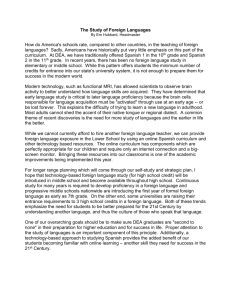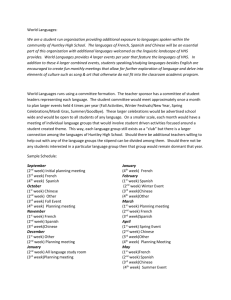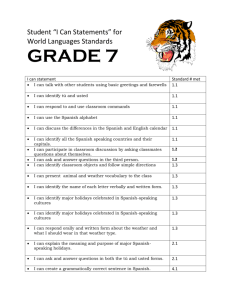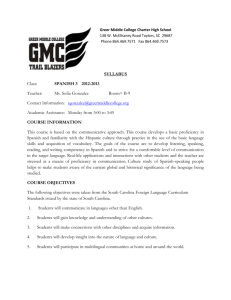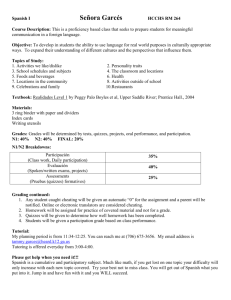2013 - Saint Louis University
advertisement
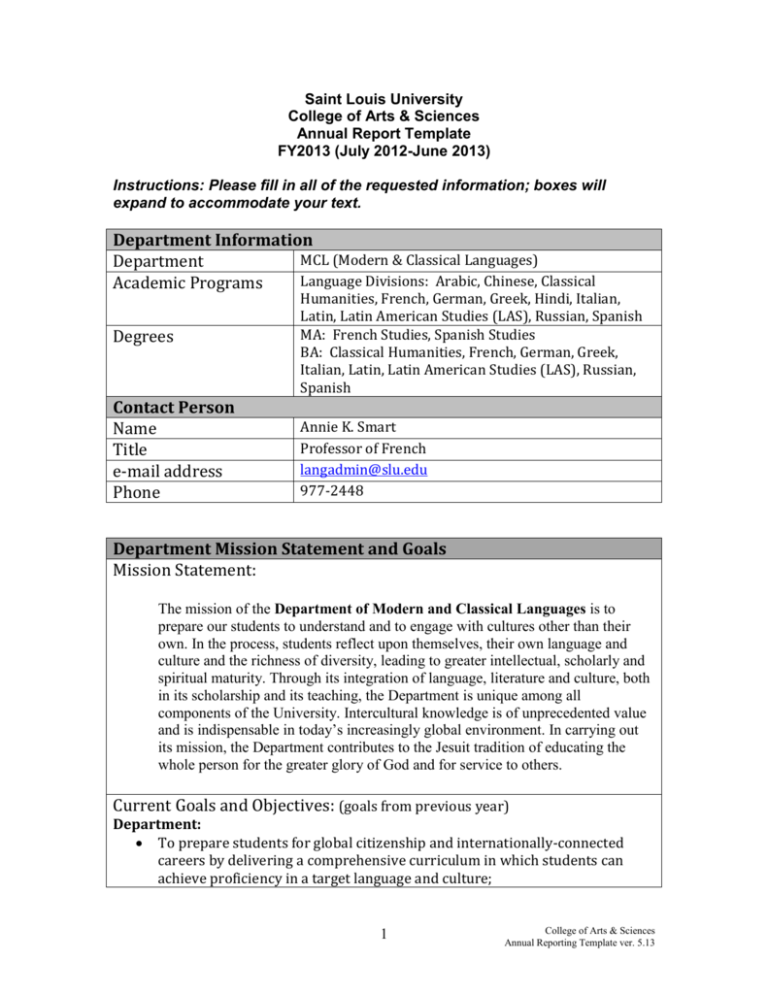
Saint Louis University College of Arts & Sciences Annual Report Template FY2013 (July 2012-June 2013) Instructions: Please fill in all of the requested information; boxes will expand to accommodate your text. Department Information MCL (Modern & Classical Languages) Department Language Divisions: Arabic, Chinese, Classical Academic Programs Degrees Contact Person Name Title e-mail address Phone Humanities, French, German, Greek, Hindi, Italian, Latin, Latin American Studies (LAS), Russian, Spanish MA: French Studies, Spanish Studies BA: Classical Humanities, French, German, Greek, Italian, Latin, Latin American Studies (LAS), Russian, Spanish Annie K. Smart Professor of French langadmin@slu.edu 977-2448 Department Mission Statement and Goals Mission Statement: The mission of the Department of Modern and Classical Languages is to prepare our students to understand and to engage with cultures other than their own. In the process, students reflect upon themselves, their own language and culture and the richness of diversity, leading to greater intellectual, scholarly and spiritual maturity. Through its integration of language, literature and culture, both in its scholarship and its teaching, the Department is unique among all components of the University. Intercultural knowledge is of unprecedented value and is indispensable in today’s increasingly global environment. In carrying out its mission, the Department contributes to the Jesuit tradition of educating the whole person for the greater glory of God and for service to others. Current Goals and Objectives: (goals from previous year) Department: To prepare students for global citizenship and internationally-connected careers by delivering a comprehensive curriculum in which students can achieve proficiency in a target language and culture; 1 College of Arts & Sciences Annual Reporting Template ver. 5.13 To promote a strong culture of research among faculty members and high pedagogical standards; To increase an awareness of other cultures and a cultural sensitivity both in the classroom and on campus. Undergraduate Programs: To foster students’ intercultural competence and intellectual curiosity by deepening their understanding of other cultures and how other cultures relate to their own; To develop the skills and knowledge necessary to function meaningfully in an international context; To encourage students to broaden their experience and knowledge of other cultures through study abroad. MA Programs: To enhance the profile of our two existing programs, through encouraging student research and recruiting excellent students; To explore the possibility of adding an MA in Italian Studies; To position our students to be successful in the professional paths that they may choose after graduating from our programs. Please specify progress made towards meeting these goals in the last year: Department: Promoting a culture of research: formation of the MCL research group to discuss works in progress (1 article discussed has been accepted for publication; 4 have been submitted); chair also met with faculty in one-onone meetings to encourage research agendas and track progress towards tenure/promotion Preparing students for global citizenship: curriculum of all BA Programs constantly updated; students encouraged to apply for international internships and careers (promoting Fulbright Scholarships; applying to Peace Corps); special focus on developing Latin American Studies Program: LAS300 taught as Micah House course; Increasing cultural awareness: cultural events sponsored at various venues on campus, especially during Atlas Week; MCL faculty participate in interdisciplinary research groups (Cross-Cultural Center). Work needs to be done regarding department’s visibility on campus: for example, our department is not represented in the new Center for Global Citizenship. Undergraduate Programs: Intercultural competence: curriculum for all programs updated to include a cultural focus – students given both knowledge of cultures and analytical tools to examine cultures; students encouraged to participate in various 2 College of Arts & Sciences Annual Reporting Template ver. 5.13 cultural events on and off campus (“Happy Chinese” contest, for example) Developing skills/knowledge within an international context: language programs work towards proficiency and hone critical thinking skills; faculty works with students to develop professional skills (presenting at Spanish/French Student, Senior Legacy Symposia; writing and submitting articles and abstracts; applying for research grants, scholarships, fellowships); students encouraged to “internationalize” their career / other majors Study abroad: new programs added in Italy; new summer study abroad program in France; faculty helps students find opportunities and scholarships for study abroad MA Programs: Enhance profile of MA in French / MA in Spanish: new promotional material for Spanish; record number of applicants in Spanish; MA Program in French now offers dual-degree with Université de Poitiers; annual Symposium being used to market program and recruit students; MA in Italian Studies: conversation on this subject has been initiated; we hope to continue work in this area; Professional development of students: MA students successful in finding employment / pursuing higher degree. We hope to continue work in this area. Future Goals and Objectives: (describe goals for the coming year) Each language division and program has its own set of goals. The chair helps the various program coordinators achieve their goals, and also sets objectives for the department. Here are the goals and objectives for the department: Foster a culture of research and intellectual exchange in the department; Promote graduate & undergraduate research; Update teaching technologies and train GTAs, new adjuncts; Continue to strengthen our ties to local international communities; “Grow” the department: initiate faculty retreat + series of conversations on future directions for department; Update our approach to promoting the department on campus, with prospective students, and with alums; Update vital departmental documents: revise Rank & Tenure guidelines, assessment tools; Continue professional development of LLC to better meet needs of MCL faculty & students; Special focus on developing 3 language divisions: German, Classics, Chinese 3 College of Arts & Sciences Annual Reporting Template ver. 5.13 Student Learning Outcomes Please list your learning outcomes: Departmental outcomes listed for 210level + BA; outcomes for MA Programs in French / Spanish Assessment of Student Learning Outcomes (210 level, major, MA) Language divisions have two desired outcomes (with Outcomes for 210 some variance according to language): level: Assessment Method (s) Data Source Assessment Results Actions Outcomes for the BA: Assessment Method (s) 1. proficiency (oral, written) according to the ACTFL scale (usually either Novice-High or Intermediate-Low) 2. Cultural competence 1. 210 final exam (written) and final oral interview 2. Portfolios; participation in cultural events and reflection papers; cultural component to exams Data is collected at the end of the semester. All students are tested, and ideally a report is written compiling the data. Selected students also complete the SLUPE. Date for the proficiency goals are regularly compiled; cultural competence data less so. All language divisions are engaged in assessing proficiency and cultural competence. Articulation of proficiency goals needs to be streamlined (not expressed in terms of 5 dimensions). Data needs to be collected and stored in a more systematic way. Language divisions have many different desired outcomes, including: 1. proficiency (oral, written) according to the ACTFL scale (usually either Intermediate-High or Advanced-Low) 2. Cultural competence 3. Critical thinking skills 4. Solid grasp of a field of knowledge Methods vary: Some divisions ask majors to provide a spontaneous writing sample and an oral interview; others ask majors to complete a capstone project; Spanish asks its majors to present a paper at the French-Spanish 4 College of Arts & Sciences Annual Reporting Template ver. 5.13 Student Symposium. The methods above assess proficiency, critical thinking skills, knowledge of a field, and in some cases cultural competence. Data Source For capstones and the Symposium presentation, all majors must comply. For spontaneous writing samples and oral interviews, these are completed at the end of the student’s career. Generally 75% of the students participate. Assessment Results Actions Assessment results show that most students gain an Intermediate-High proficiency level in their career at SLU. Most students are able to make cogent arguments in another language, and are able to express abstract ideas. Students demonstrate an indepth knowledge of a selected topic within the field. Students demonstrate an ability to understand cultural differences, and to compare another culture to their own. Articulation of proficiency goals needs to be streamlined (not expressed in terms of 5 dimensions). Data needs to be collected and stored in a more systematic way. Outcomes for MA (Spanish, French): To prepare students successfully for a career in which they are engaged in language instruction, or for future study towards a PhD. Students therefore must demonstrate an ability to: 1. express themselves cogently in another language; 2. conduct research and integrate secondary sources in an original argument 3. discourse in depth on a variety of topics pertaining to the field (French-/Spanishspeaking worlds) Assessment Method (s) Progress is assessed through coursework and final exams. Success of desired outcomes of the Programs is assessed through comprehensive final oral and written examinations (Spanish); comprehensive final written examinations or written final project + oral 5 College of Arts & Sciences Annual Reporting Template ver. 5.13 examinations (French). Preparation for a career in the profession is assessed through TA training & seminars (500 course); participation in the annual French/Spanish Student Symposium. Data Source Final exam data is collected from all students finishing the MA, at the end of their career at SLU, and is discussed both by examination committees. Professional training: all TAs participate in Orientation & training sessions; are regularly observed and mentored by course coordinators. Assessment Results All students have achieved desired outcomes. Professional training outcomes achieved: students accepted into PhD Programs, students obtain teaching jobs. Data needs to be shared in a more consistent fashion. Actions Department Accomplishments Awards or Distinctions: (list major awards or distinctive achievements earned by the department in the past year) New joint Master’s Degree Program (dual degree program) started between MA in French and Université de Poitiers Department hosted renowned French author Pascal Quignard, in partnership with Webster and Washington Universities (visit organized by Dr. Jean-Louis Pautrot, who is an expert on Quignard’s work) Language Learning Center’s software (SLUPE and Nanovox), developed by Lab Director Dan Nickolai, is being used by over 100 institutions in countries around the globe. SLUPE account holders include: Defense Language Institute, American Councils for International Education, Harvard, MIT, Northwestern, Carnegie Melon, & Yale; the list of countries for NanoVox is vast : Denmark, France, Vietnam, Thailand, Brazil, Russia, Japan, Indonesia, Poland, Switzerland, Greece, Ukraine. Faculty honors: (list separately distinctive honors or special recognition awarded to individual faculty) Publications & Grants: Dr. Jean-Louis Pautrot published Pascal Quignard (Gallimard-Grasset, March 2013); this publication is being distributed worldwide through French embassies and consulates by the French government. Fr. Claude Pavur, S.J., published glosses for all the adjectival phrases in Horace’s Odes (Easy on the Odes, available at the Latin Teaching Materials 6 College of Arts & Sciences Annual Reporting Template ver. 5.13 Website and on academia.edu). Dr. Pascale Perraudin co-edited a guest issue of an important journal in her field: Postcolonial Text: “Transnational Inquiries: Representing Postcolonial Violence and Cultures of Struggle.” Dr. Claudia Karagoz has submitted an NEH grant proposal for a Summer Institute, in partnership with a colleague at Auburn University Awards & Honors: Dr. Kara McBride (Spanish) received the 2012 James H. Korn Award for Scholarship on Teaching and Learning. Dr. Lili Guo (Chinese) received the SGA Faculty Excellence Award for Arts & Sciences. Dr. Julia Lieberman (Spanish) was awarded the Helen I. Mandeville Award for Excellence in Undergraduate Teaching in the Humanities. Dr. Yaoska Tijerino (Spanish) was invited to read her poetry at the International Festival of Poetry in Granada, Nicaragua. This is one of the most important festivals of poetry around the globe. Other invited poets in attendance included Derek Walcott (Nobel Prize) and Robert Pinsky (US Poet Laureate, 1997-2000.) Dr. Evelyn Meyer was a guest scholar at University of Bamberg, Germany, where she participated in research groups and symposia. Student honors: (list separately distinctive honors or special recognition awarded to students) Around 100 people attended the 2013 French & Spanish Graduate and Undergraduate Student Symposium. Students presented on topics ranging from “Literature and Urbanism in 18th-century France” to “The Representation of Latinos in American Musicals.” Two of our Russian double-majors, Michael Meyer (Biology) and Daniel Pike (Biochemistry) have been awarded a grant to work in a research lab at Moscow State University this summer. Tim Wilhelm (French/International Studies) was awarded a national scholarship, the Jeanne Marandon Scholarship, for study abroad in Lyon, France. Donald Dodsworth, who is studying Chinese, won the Silver Prize (2nd-year student category) at the US Midwest Chinese “Bridge” Speech Contest organized by Northwestern University, the University of Chicago, Purdue University, and the University of Wisconsin. Community engagement: (describe department involvement in the community) A total of 442 hours of volunteer service work were done for Dr. Kara McBride’s Spring 2013 Spanish 422 Language Acquisition class. The French Division organizing and hosting the performance of a French Play on November 5, 2012, in partnership with other local universities and cultural organizations. 7 College of Arts & Sciences Annual Reporting Template ver. 5.13 The Italian Division liaised with the local Italian-American community; this cooperative relationship has resulted in a $1000 scholarship for 2 undergraduate students. The Chinese Division strengthened its ties to the local Chinese community: 2 SLU students in Chinese performed a song at the Chinese New Year Celebration, sponsored by the St. Louis Chinese Association and the Modern Chinese Language School (over 900 people attended this event). 8 College of Arts & Sciences Annual Reporting Template ver. 5.13
